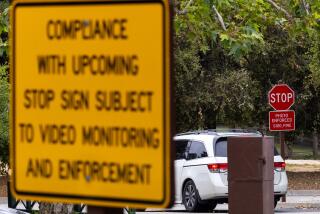Federal Fines Rise Sharply : Regulation: Agencies are now collecting about $2 billion a year, thanks primarily to expanded authority.
- Share via
WASHINGTON — In an ironic commentary on the Bush Administration in its final days, regulators say that they are now collecting about $2 billion a year in fines against individuals and private business--more than twice the amount when the President took office in 1989.
The sharp increase in fines stems primarily from an expansion of authority that Congress has recently granted to some agencies, as well as a huge increase in the budget and staff of the U.S. Justice Department, which handles many of the court cases.
While some business officials say the increase indicates that the government has become overzealous in enforcing its rules and regulations, business and consumer groups do agree that collections will likely increase under the incoming Clinton Administration.
President-elect Bill Clinton has promised to be a more activist chief executive than his Republican predecessors. Both Ronald Reagan and George Bush were strong proponents of business deregulation.
“I would expect in the incoming Clinton Administration to see an acceleration of the trend,” said Murray Weidenbaum, director of the Center for the Study of American Business at Washington University in St. Louis. “But you wonder if some of these fines are necessary. I see a lot of small business people being hounded for essentially technical violations.”
Many consumer groups say that despite the big increase in fines, much remains to be done in such areas as cleaning up the environment, protecting the health and safety of Americans and combatting financial fraud. They say that they will be watching the Clinton Administration to ensure regulatory enforcement efforts are a top priority.
A further escalation in government fines, however, could possibly touch off nasty confrontations with many of the industries that the President-elect hopes to enlist to help rebuild the nation’s infrastructure, business executives say.
Already, business has expressed growing concern about the level of regulation.
In a 1992 survey by the National Federation of Independent Business, members of the Washington-based small-business trade group ranked government regulation eighth on a list of 75 concerns. That was 11 levels higher than in a previous survey seven years ago.
As an example of their concern about regulatory zealousness, some critics cite the $600,000 indecency fine recently imposed by the Federal Communications Commission on the company that employs controversial radio host Howard Stern.
But those charged with carrying out federal regulatory policies are unapologetic. Despite embracing efforts to deregulate business, federal agency chiefs say fines have taken center stage in enforcement because they are a quick and effective deterrent compared to more time-consuming and difficult sanctions, such as seeking criminal prosecution or business closures.
“Rule No. 1 is don’t create unnecessary rules, and rule No. 2 is beat the hell out of anybody who violates the necessary rules,” Securities and Exchange Chairman Richard C. Breeden said. “I don’t see any inconsistency.”
Guided by such a hard-boiled philosophy, fines and penalties in the last four years have jumped virtually across the board--from the huge Department of Health and Human Services to the tiny Federal Maritime Commission.
Fines collected by the Maritime Commission jumped from $2.6 million to $21.7 million between 1988 and 1991, according to the Treasury Department, where all fines collected by the federal government are deposited.
Fines collected by Health and Human Services have skyrocketed from between $2 million and $4 million in the late 1980s to a whopping $127.4 million in 1991 and $9 million last year. A spokeswoman for the department’s office of inspector general say the increase was largely because of several large Medicaid and Medicare fraud investigations.
However, some of the least-noticed increases have come at the Environmental Protection Agency, the FCC and the SEC--all of which were given greater enforcement resources or were granted broad new authority to levy bigger fines in the last four years.
In 1989, for example, Congress substantially increased the dollar amounts of fines the FCC could levy against broadcasters, cable operators and common carriers such as telephone companies.
Although there are several categories of fines, generally the agency can now levy penalties up to $200,000 against each broadcast station or cable outlet and up to $1 million against telephone companies and other common carriers. Those limits are about 10 times the previous maximums.
Similarly, Congress passed the Securities Enforcement Remedies and Penny Stock Reform Act in 1990, giving the SEC authority to fine violators of any federal securities law up to $500,000 per charge. Previously, the agency could only fine individuals for violating the SEC’s rules against insider trading.
The change in law, Breeden said, enabled the SEC to impose huge fines against former junk bond king Michael R. Milken, who pleaded guilty in 1990 to six counts of securities law violations. It also boosted the total amount of fines collected by the SEC to $129 million from $1 million in 1988, according to Treasury Department figures.
At the EPA, administrators credit better relations with the Justice Department for helping to improve enforcement, while sharply boosting penalties and fines. The increase was capped by the $22-million fine levied in 1992 in connection with the Exxon Valdez oil spill, EPA officials said.
Nevertheless, many Bush appointees grouse that their Administration is largely perceived as lax on business and regulatory enforcement.
Some longtime Bush critics, however, are noticing and acknowledge that the President has made significant efforts to reverse what critics described as lax oversight of business during the Reagan Administration.
“The Bush Administration has been a lot better than the Reagan Administration in (regulatory) enforcement,” said Joan Claybrook, executive director of Public Citizens, a consumer watchdog group. “They don’t seem to be as ideological. I’m surprised that they’ve paid this much attention to enforcing the law.”
Enforcement Toughens
Because of new laws and tougher enforcement, fines collected from business and individuals by 39 major U.S. agencies and departments jumped sharply during the Bush Administration.
Figures are in millions. 1992: $1,861 1991: $1,914 1990: $1,510 1989: $1,646 1988*: $902
SOURCE: U.S. Treasury Department
* Government fiscal year
More to Read
Inside the business of entertainment
The Wide Shot brings you news, analysis and insights on everything from streaming wars to production — and what it all means for the future.
You may occasionally receive promotional content from the Los Angeles Times.










